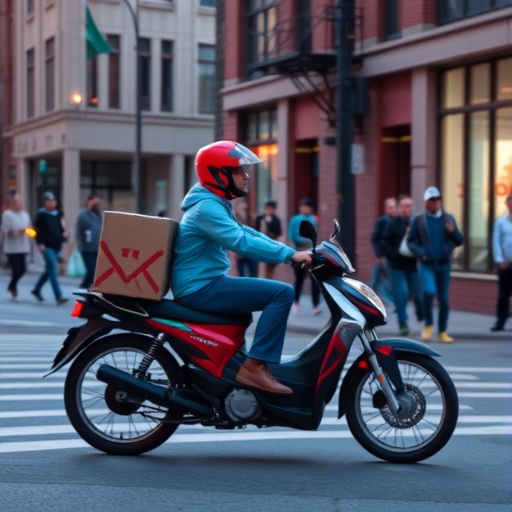In an era where urban environments are growing at unprecedented rates, the challenges of last-mile delivery in megacities lie at the forefront of logistics innovation. Traditional delivery methods, mired by traffic congestion and inefficient routing, are increasingly becoming incompatible with the needs of modern consumers. In response, leading researchers have turned to artificial intelligence for solutions. A revolutionary study led by Rabelo, Rincón-Guio, and Laynes shines a light on using reinforcement learning to enhance last-mile delivery systems, particularly in underdeveloped megacities.
The concept of last-mile delivery often refers to the final stage of the logistics process— where goods are delivered from a transportation hub to their final destination. While it may seem straightforward, this segment can account for a significant portion of logistics costs and is notoriously complex. In megacities where infrastructure is underdeveloped and traffic conditions are unpredictable, this final leg presents unique challenges. As urban populations swell, so do the demands for efficient, timely deliveries. Understanding how technological innovation can help optimize this process is of paramount importance.
One of the prime innovations in the study revolves around the use of reinforcement learning, a branch of machine learning where algorithms learn to make decisions through trial and error. By simulating various traffic scenarios, delivery routes, and urban challenges, reinforcement learning can help develop smarter delivery strategies that dynamically adapt to ever-changing conditions. The researchers employed advanced algorithms that not only learn from past data but also from real-time inputs, making adjustments instantly based on current traffic situations and delivery needs.
To further optimize the delivery process, the researchers incorporated social media data as an auxiliary resource for traffic prediction. Underdeveloped megacities often suffer from outdated traffic systems and limited data availability. However, social media is a treasure trove of real-time information. By analyzing geotagged posts, tweets, and other social media signals, the algorithms can gain insights into traffic trends, public events causing congestion, and even potential disruptions due to weather conditions. This integration allows for a more holistic approach to traffic prediction and situational awareness, enhancing the accuracy of the proposed delivery models.
Moreover, the study doesn’t merely focus on the technical capabilities of reinforcement learning and social media data. It also emphasizes equitable access to delivery services. In urban hubs where delivery access can be limited for vast segments of the population, equitable logistics become crucial. The research explores strategies that ensure delivery routes accommodate underserved areas, promoting social equity while maximizing operational efficiency. This inclusive approach not only improves service quality but also empowers communities that may otherwise be neglected in urban logistics.
The results from Rabelo and his team demonstrate a considerable improvement in delivery times and operational costs. In controlled simulations, the application of these advanced models outperformed traditional routing methods significantly. The combination of reinforcement learning and real-time data feed not only predicts traffic more accurately but also allows for proactive adjustments to delivery routes. As a result, deliveries could be completed more efficiently, often arriving ahead of customer expectations.
Despite its success, the application of these technologies raises pertinent questions about scalability and implementation in real-world scenarios. Underdeveloped megacities come with various infrastructural, societal, and technological limitations that may hinder the widespread adoption of such advanced logistics solutions. Stakeholders—including local governments, tech companies, and logistics providers—must collaborate to create frameworks that facilitate the integration of these technologies into existing systems. This multi-faceted collaboration is essential for overcoming the barriers posed by insufficient infrastructure.
Furthermore, this research presents an interesting cross-section of urban planning and transportation logistics. As cities evolve and face increasing strain from population growth, integrating AI-driven tactics for last-mile delivery could transform urban landscapes. Smart cities of the future may rely heavily on such innovations, combining various forms of transportation and delivery, ranging from electric vehicles to drones, all coordinated through sophisticated AI algorithms that account for real-world conditions.
Another remarkable aspect of Rabelo et al.’s study is its potential applicability beyond urban delivery scenarios. The methodology employed could inform other logistic challenges across different contexts, including rural areas or emergency response situations. As technological advancements continue to flourish, harnessing them for practical applications has far-reaching implications—extending the benefits of smart logistics to varied geographic and socio-economic contexts.
To conclude, the exploration presented in this research not only exemplifies the capabilities of modern AI technology in addressing age-old logistical challenges but also underscores a significant shift in how we envision urban delivery systems. By employing reinforcement learning and leveraging social media data, one can foster more efficient, equitable, and responsive delivery models. As urbanization continues to expand in the global landscape, approaches such as these may very well be the cornerstone for shaping the future of logistics in megacities.
In sum, Rabelo, Rincón-Guio, and Laynes’s groundbreaking study not only paves the way for smarter logistics in underdeveloped megacities but also serves as a clarion call for future research that embraces innovation and inclusivity in urban logistics. The crossroads of technology and social equity presents both challenges and opportunities, and this study is an important step in harnessing those possibilities for better urban living experiences.
Subject of Research: Last-mile delivery optimization using reinforcement learning and social media-based traffic prediction in underdeveloped megacities.
Article Title: Effective last-mile delivery using reinforcement learning and social media-based traffic prediction in underdeveloped megacities.
Article References: Rabelo, L., Rincón-Guio, C., Laynes, V. et al. Effective last-mile delivery using reinforcement learning and social media-based traffic prediction in underdeveloped megacities. Discov Cities 2, 69 (2025). https://doi.org/10.1007/s44327-025-00112-z
Image Credits: AI Generated
DOI: https://doi.org/10.1007/s44327-025-00112-z
Keywords: Last-mile delivery, reinforcement learning, urban logistics, social media data analysis, traffic prediction, megacities, underdeveloped regions, equitable access, AI technologies.




